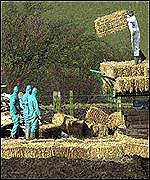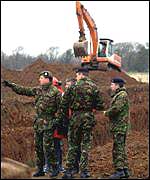 |
|
|
|
23
Pioneer Regiment

How 23 Pioneer Regiment
helped with the foot and mouth crisis.
|
|
|
|
 |
| ../ main
page / news / 23 pioneer regiment news / life as slaughterman |
|
Life as a UK Army 'Professional Slaughterman'
- by Macer Hall |
|
Only a few brown spots of dried sheep's blood dotted around
the collar of the white anti-contamination suit worn by Cpl
Steve Milnthorpe give away his grim duty in the Army's
effort against foot and mouth disease. Armed with a bolt gun
rather than a rifle, the 36-year-old section commander from
the Pioneer Regiment is part of a team charged with slaughtering
up to 13,000 sheep a day. Nothing in 19 years of soldiering
has prepared him for the experience.
|
 |
"I have been to Northern Ireland and the Gulf, but
I never thought I would have to deal with anything like this.
It was a big shock to the system when we were shown how to
slaughter an animal for the
first time. There were big guys, trained and hardened soldiers,
who were saying they didn't have the stomach for it."
When the Army was called in to support the Ministry of Agriculture's
battle against the disease, Cpl Milnthorpe volunteered to
be trained by a professional slaughterman and was sent to
join in Operation Peninsula, the Army's name for the campaign
in Cumbria. For seven days he has been working up to 12 hours
a day amid the noise and acrid stench of a vast pit that will
be a grave for half a million animals.
|
|
As he relaxes during a mid-morning break in a portable cabin
on the site, a disused airfield at Great Orton, he has lost
count of how many he has killed that day. "Once you have
done your first cull, you begin to learn to switch off and
get on with it. There's a job to be done and you just have
to crack on. We have learnt to incorporate ourselves into
the system. It is a case of crack on and get the job done."
It is grisly work. The sheep - uninfected animals from fields
bordering farms suffering outbreaks - are rendered senseless
as the captive bolt stunner fires a steel bolt that penetrates
their skull. A metal rod is then inserted into their spinal
cord to break the nerves, a process known as "pithing".
The task has been carried out with the military's customary
precision.
Cpl Milnthorpe said: "I volunteered because I see it's
a job that's got to be done. Everyone here is a volunteer.
If they want to leave, they can go at any time. We haven't
had any leave so far. It's nasty work but morale is good.
Once we've finished for the day, we don't like to talk about
what we've been doing. That's the time to sit down and relax,
have a couple of beers and try to put it behind you."
For Major Neil Smith of the Royal Veterinary Corps, the true
cost of the disease is to the farmers. Since early in the
crisis, he has been involved in diagnosing cases and overseeing
the slaughter of animals on infected farms. He said: "It
is not nice seeing animals killed but it is done humanely.
What is worse is the human tragedy." Their stoicism has
impressed him. He said: "Obviously, they are extremely
upset and distressed but we have never experienced them turning
their anger against us. It is not something any of us feel
comfortable with, walking onto a farm and then having to face
the trauma of telling a farmer that his livestock is infected.
|
|
"We also have to cull the young lambs. They are injected
with the same drug used to put down pet cats and dogs. We
do up to 3,500 a day. It's terrible to see, but we understand
it has to be done."
"It's an extremely efficient and effective operation
we have going there. We are culling somewhere between 10,000
and 13,000 sheep a day. It seems a strange thing to be proud
of, but it is very impressive. We've got a good team together."
|
|
| Other troops echo
his pride at the efficiency of the operation. At the headquarters
of the Cumbrian effort, in a network of mobile cabins on a Carlisle
industrial estate, Lt Col Peter Hollerhead, a Territorial Army
officer attached to the Royal Engineers, described the war against
foot and mouth as a military operation like any other. The officer,
who is using his civilian expertise in the waste disposal industry
to help in the task of burying the carcasses in landfill sites,
said: "This dreadful disease, in a military context, is
the enemy and we have got to defeat it." |
 |
Pointing to the command map, adorned with multi-coloured
flags indicating infected and decontaminated farms, he said:
"Our job is to turn every one of those red flags green.
That's how we will know we have got this enemy on
the retreat."
Other soldiers spoke of the camaraderie among the teams combatting
the disease. Staff Sgt Stan Norcross, of the Royal
Logistics Corps, said:
"It is hard work but we are all pulling together. When
you speak to the farmers, you begin to understand how terrible
this crisis has been for them.
"One farmer told me how he had
never heard the dawn chorus because he was so used to the
sound of cattle when he got up for milking. Now his cattle
have been slaughtered, all he can hear in the morning is the
birds singing and the wind whistling through the trees."
|
|
Soldiers
sign up to help with cull
|
|
|
